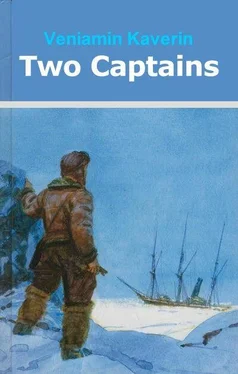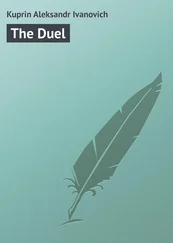We found the expedition, or rather what remained of it, in an area over which our planes had flown dozens of times, carrying mail and passengers to Dickson, and machinery and merchandise to Nordvik, and conveying parties of geologists prospecting for coal, oil and ores. If Captain Tatarinov were to come to the mouth of the Yenisei today he would meet dozens of great seagoing ships. On the islands which he passed he would have seen today electric lighthouses and radar installations, he would have heard nautophones guiding ships during a fog. Some three or four hundred kilometres farther upstream he would have come on the Arctic Circle Railway linking Dudinka with Norilsk. He would have seen new towns which had sprung up around oil fields, mines and sawmills.
I mentioned earlier that I had been writing to Katya from the moment I arrived in the North. A heap of unposted letters were left at N. Base which I had been hoping we would read together after the war. These letters were like a diary kept, not for myself, but for Katya. I will quote from them only those passages which describe how we found the camping site.
"1. I was astonished to learn how close life had come up to this place, which had always seemed to me so infinitely far away. It lies within a stone's throw of the Great Sea Route and you were quite right when you said that they had not found your father because they had never looked for him. Between the lighthouse and the radio station there is a telephone line, a permanent one on poles. Mines are being worked ten kilometres to the south, and if we hadn't discovered the camp site the miners would have stumbled upon it sooner or later.
"It was our navigator who first picked up the piece of canvas from the ground. Nothing surprising about it! You can pick up all kinds of stuff on a seashore. But this was a canvas strap you harnessed yourself in to haul a sledge. But when the gunner found the aluminium lid of a saucepan, and a dented tin containing balls of string, we divided the hollow between the hills and the ridge into a number of squares and started going over them-each man his own square.
"I remember reading somewhere that a single inscription carved on a stone had helped scholars to reveal the life of a whole country which had perished long before our own era. Now this place, too, gradually came to life before our eyes. I was the first to spot the canvas boat, or rather to guess that this flattened pancake thicking out of the eroded earth was a boat; moreover, a boat resting on a sledge. In it lay two guns, a skin of some kind, a sextant and a pair of field-glasses, all rusty, covered with mould and moss. By the ridge which protected the camp from the sea, we found various articles of clothing, among them a mouldering sleeping-bag made of reindeer-skin. Evidently a tent had been pitched there, because the drift logs lay at an angle forming a square enclosure with the rocks. In this "tent" we found a food basket fastened with a strip of sailcloth and containing several woollen stockings and shreds of a blue and white blanket. We also found an axe and a "fishing-rod", that is, a length of twine with a hook at the end made from a bent pin. Some of the articles lay scattered round the "tent"-a spirit lamp, a spoon, a small wooden box containing various odds and ends, including several thick sail-needles, also home-made. On some of these objects the rubber stamp "Trapping Schooner St. Maria" or the inscription "St. Maria" could still be made out. But this camp site was completely deserted-there was not a soul there, living or dead.
"2. It was a home-made cookstove-a tin casing enclosing a bucket with a lid. Usually an iron tray was placed underneath for burning bear or seal fat. But there stood an ordinary primus heater. I shook it and found that it still contained some paraffin oil. I tried to pump it up, and the oil squirted up in a thin stream. Next to it we found a tin marked "Borsch. Vikhorev Cannery. St. Petersburg, 1912". Had we wished to, we could have opened that tin of borsch and heated it up on the primus-stove, which had been lying in the earth for nearly thirty years.
"3. We returned to the camp after a fruitless search in the direction of Galchikha. This time we approached it from the southeast, and the hills, which we had previously seen as an unrelieved undulating line, now presented quite an unexpected appearance. It was a single large scrap running into stony tundra intersected by deep notches, as though excavated' by human hands. We walked along one of these hollows, and none of us at first paid any attention to the caved-in stack of driftwood between two huge boulders. There were only a few logs, not more than half a dozen, but one of them had a sawn end. It was this sawn log that struck us. Up till now we had believed that the camp had been situated between the rocky ridge and the hills. It could have been shifted, however, and before long we found that this was so.
"It would be difficult to enumerate half the things we found in this hollow. We found a watch, a hunting knife, several ski-sticks, two single-barrelled Remingtons, a leather vest and a tube containing some kind of ointment. We found the rotted remains of a bag containing photographic film. And finally, in the lowest part of the hollow, we found a tent, and under that tent, its edges still held down by drift logs and whalebone to prevent it being blown away in a gale-under this tent, which we had to hack out of the ice with axes, we found him whom we were looking for…
It was still possible to guess in what attitude he had died-his right arm flung out, body stretched out as if listening to something. He lay on his face, and the satchel in which we found his farewell letters was under his chest. Obviously, he had hoped that the letters would be better preserved under cover of his body.
"4. There could have been no hope for our ever seeing him alive. But until the word Death had been pronounced, until I had seen it with my own eyes, this childish thought had still lingered in my heart. Now it was gone, but in its stead another light burned up brightly-the thought that it was not for nothing, not in vain, that I had been seeking him, that for him there would be no death. An hour ago the steamer came alongside the electric lighthouse and the sailors, with heads bared, carried the coffin aboard covered with the tattered remains of the tent. A salute was fired and the ship flew its flag at half-mast. Alone, I wandered around the deserted camp of the St. Maria and here I am, writing to you, my own, dear Katya. How I wish I were with you at this moment! It will soon be thirty years since that brave struggle for life ended, but I know that for you he died only today. I am writing to you from the front, as it were, telling you about your father and friend, who had fallen in battle. Sorrow and pride for him fill my soul, which is stirred to its depths by this spectacle of immortality…"
Chapter Two
THE UNBELIEVABLE
"How I wish I were with you at this moment"-I read and reread these words, and they seemed to me so cold and empty, as if I were in a cold, empty room, addressing my own reflection. It was Katya I needed, and not this diary-the living, bright, sweet Katya, who believed in me and loved me. Once, shaken by the fact that she had turned her back on me at her mother's funeral, I had dreamt of coming to her, like the Gadfly, throwing at her feet the evidence that proved me to have been right. Afterwards the whole world had learnt of her father through me and he had become a national hero. But for Katya he remained her father-who, if not she, was to be the first to learn that I had found him? Who, if not she, had told me how wonderful everything would be if the fairy-tales we believed in still came true on earth? Amid the cares, labours and perturbations of the war I had found him. Not a boy, fascinated by a dim, glamorous vision of the Arctic which illumined his mute, half-conscious world, not a youth striving with youth's stubbornness to have his own way-no, it was as a mature man, who had experienced everything, that I stood confronting a discovery destined to become part of the history of Russian science. I was proud and happy. But a surge of bitterness rose up inside me at the thought that it could all have been different.
Читать дальше












